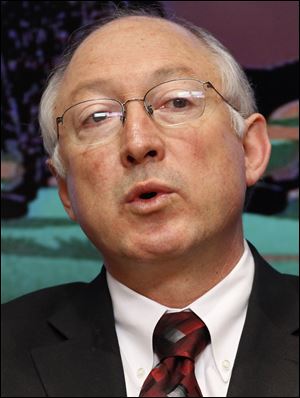
Interior Secretary Ken Salazar leaving Obama administration
1/16/2013
Interior Secretary Ken Salazar
WASHINGTON — Interior Secretary Ken Salazar, who oversaw a moratorium on offshore drilling after the BP oil spill and promoted alternative energy sources throughout the nation, will step down in March.
Salazar, a former Colorado senator, has run the Interior Department throughout President Obama's first term and pushed renewable power such as solar and wind and the settlement of a longstanding dispute with American Indians.
In a statement, Obama said Salazar had helped "usher in a new era of conservation for our nation's land, water and wildlife" and had played a major role in efforts to "expand responsible development of our nation's domestic energy resources."
Salazar said in a statement that the Interior Department was helping secure "a new energy frontier" and cited an aggressive agenda to reform oil and gas leases, which he said had increased offshore drilling safety.
Under his watch, the Interior Department has authorized nearly three dozen solar, wind and geothermal energy projects on public lands that provide enough electricity to power more than 3 million homes, Salazar said.
Washington Gov. Chris Gregoire, a longtime Obama ally, is among those mentioned as a potential successor to Salazar, along with John Berry, director of the White House Office of Personnel Management. Berry is a former assistant Interior secretary and director of the National Zoo. Gregoire, whose term expires today, also is considered a candidate to replace Lisa Jackson at the Environmental Protection Agency.
Salazar, 57, entered the Senate with Obama in 2005. At Interior, he gained the most attention for his role in the drilling moratorium, a key part of the administration's response to the April 2010 explosion of the Deepwater Horizon rig in the Gulf of Mexico. It was one of the largest environmental disasters in U.S. history and led to the unprecedented shutdown of offshore drilling.
Business groups and Gulf Coast political leaders said the shutdown crippled the oil and gas industry and cost thousands of jobs, even aboard rigs not operated by BP PLC.
But Salazar said the industry-wide moratorium was the correct call and that his ultimate goal was to allow deepwater operations to resume safely. He acknowledged that the drilling ban caused hardship, but he said his job was to protect the public and the environment even as the administration tried to boost domestic energy production.
The moratorium was lifted in October 2010, although offshore drilling operations did not begin for several more months. Some Gulf Coast lawmakers continue to complain about the slow pace of drilling permits under the Interior Department, which renamed and revamped the agency that oversees offshore drilling in the wake of the spill.
Salazar also approved the nation's first offshore wind farm, Cape Wind, off the Massachusetts coast.
On land, Salazar has promoted solar power in the West and Southwest, approving an unprecedented number of projects, even as oil and gas continue to be approved on federal land.
Salazar also oversaw the settlement of a multibillion dispute with Native American tribes that had lingered for more than a decade.
Throughout his tenure, Salazar tangled with oil companies.
"We don't believe we ought to be drilling anywhere and everywhere," Salazar said in 2010, before the BP spill. "We believe we need a balanced approach and a thoughtful approach" that allows development of oil and gas leases on public lands while also protecting national parks, endangered species and municipal watersheds.
Salazar criticized the Bush administration for what he called a "headlong rush" to lease public lands. Early in his tenure, Salazar suspended 60 of 77 leases in Utah that had been approved by the Bush administration.
"In the prior administration the oil and gas industry were the kings of the world. Whatever they wanted to happen, happened," Salazar said in January 2010, adding that those days were over.
Salazar is the latest Cabinet secretary to leave the administration and the second Hispanic Cabinet member to depart as Obama begins a second term. Labor Secretary Hilda Solis said announced her departure last week.
Secretary of State Hillary Rodham Clinton, Pentagon chief Leon Panetta, Treasury Secretary Timothy Geithner and EPA's Jackson also have announced plans to leave. Energy Secretary Steven Chu is widely expected to leave, though his departure has not been announced.